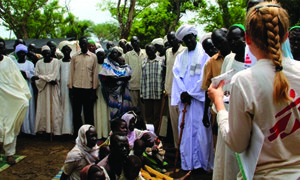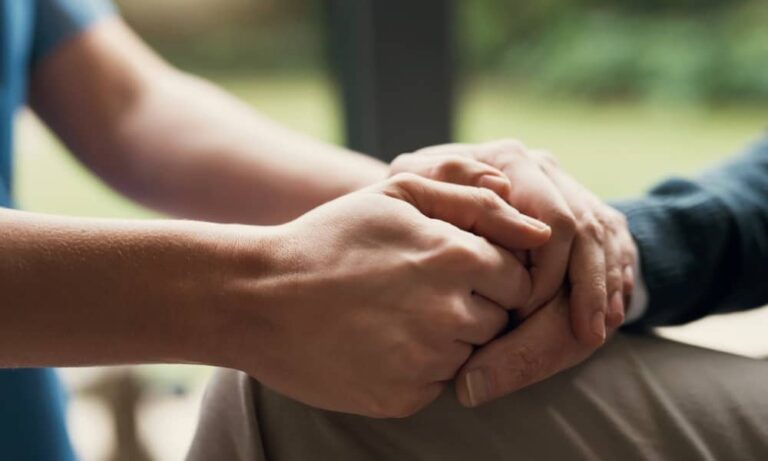Today is World Mental Health Day (WMHD), a day dedicated to global mental health education, awareness and advocacy. Psychologist Rebecca Bennett has recently returned from a field placement in South Sudan with international medical humanitarian aid organisation Médecins Sans Frontières (Doctors Without Borders). She shares her experience with us and explains why, in countries like South Sudan, where years of conflict and violence have had a dramatic impact on the mental wellbeing of the population, mental health programs are key for the future of the communities.
I had always wanted to do something in the field but was uncertain about what to do and where to go. I studied psychology and international health and already knew Médecins Sans Frontières, as they are one of the few organisations offering mental healthcare in the humanitarian field.
Already my work with Médecins Sans Frontières has taken me to Haiti, where I spent three months working with local communities who had been affected by the 2010 earthquake; and Kyrgyzstan, working with Internally Displaced People (IDP).
This year I travelled to South Sudan, where I spent nearly four months working with people in the Batil and Gendrassa refugee camps.
I was seeing people come in with a range of concerns including people who were struggling to cope with living in the camp, cases of domestic violence and people suffering more severe mental health conditions such as depression, anxiety and psychosis.
A lot of patients stick out in my mind. There was one woman, a mother of four children who was referred to the clinic as she had been talking to herself at night, seeing things that were not there and was unable to maintain a conversation with her family. Ultimately, she was not able to care for her children, which were between three and fourteen years old.
I met with her and her mother, together with the medical doctor. After consulting with the psychiatrist, we decided she needed regular meetings with the mental health team. We would encourage her to talk with her family about her illness and over the course of my time we began to see an improvement. She was beginning to do more of the daily routines, such as cooking and cleaning, as well as being able to care for her children.
She still has a long way to go in terms of her treatment, but even that she is talking about her illness and doing much better at home are big steps.
Another patient, a young man about 25 years old, was referred to us as he was not leaving his tent, behaving strangely and not taking care of himself. He had stopped seeing his wife and three children, did not shower, was not eating and would collect rubbish from around his parents’ compound where he lived. He also did not sleep well and generally appeared sad and lacking in motivation.
Asides from prescribing him the medication he needed, an important part of his treatment was counselling, both for him and his family. This included educating them about his illness and treatment, as well as working towards engaging him in the daily routine of his family.
After weeks of treatment, as I last visited him before leaving South Sudan, he was seeing his children and wife regularly again, talking about finding work. His family reported that he had gone from not speaking with them to having dinner with them, which was a great achievement.
What I’ve learnt from working in South Sudan is that after traumatic events, it is critical to help communities develop their own coping strategies. This allows them to rebuild themselves according to their own cultural beliefs and to take back control of the situation as soon as possible.
As you can imagine, working in the field has its challenges. As a psychologist and not a psychiatrist, working with people presenting psychiatric conditions can be very demanding. But I was supported by a fantastic team of medical doctors on the ground and a psychiatrist and mental health advisor based in Amsterdam. It was also challenging to be working in a completely different language, which in the camps was Arabic. I had a great translator, but nuances in mental health are simply difficult to translate.
In saying that, the rewards were tremendous: I have been able to work with a range of highly skilled people from around the world and learnt so much from them. I have had opportunities to apply my skills in areas I would not otherwise have been able to in Australia.
It has also reinforced an interest that I have in working with people who have experienced trauma. The resilience of the people, especially the children, even in the most adverse of situations has been amazing. Working in places like Haiti, Kyrgyzstan and South Sudan has given me a chance to give back on some level and to make a difference, however small.
It can be hard coming back to Australia, especially after being in a setting where the people have very few things and very limited access to services. It’s made me appreciate much more the skills we develop here in Australia and the structures we have in place for mental healthcare.
The Australian section of Médecins Sans Frontières was established in 1995, and is one of 19 international Médecins Sans Frontières offices around the world committed to delivering medical humanitarian assistance to populations in crisis. Last year, Médecins Sans Frontières Australia sent 167 field workers to work in humanitarian crises around the world. Médecins Sans Frontières delivers medical care based on need alone and operates independently of government, religion or economic influence and irrespective of race, religion or gender. For more information about Médecins Sans Frontières Australia go to www.msf.org.au or msf.tv.







